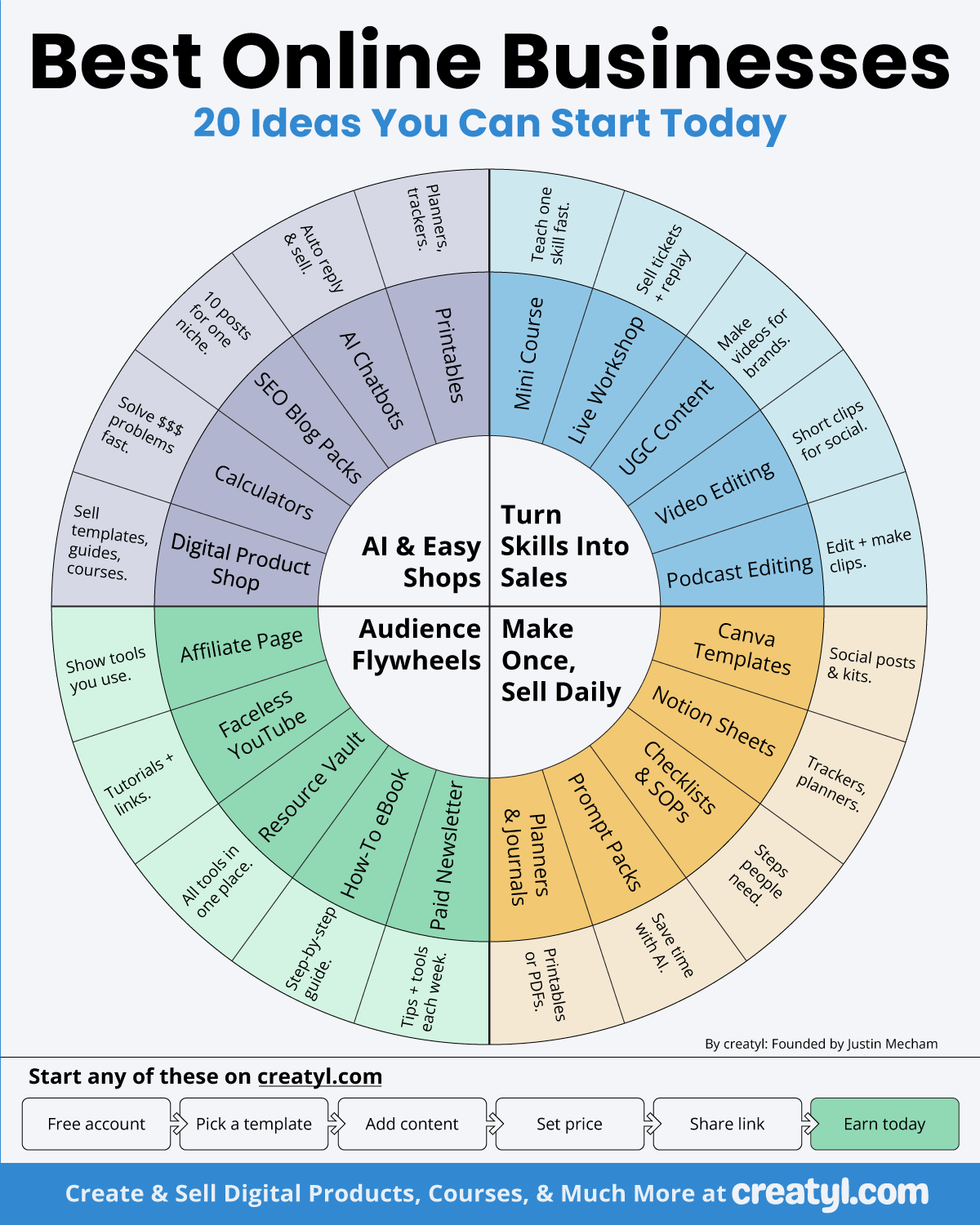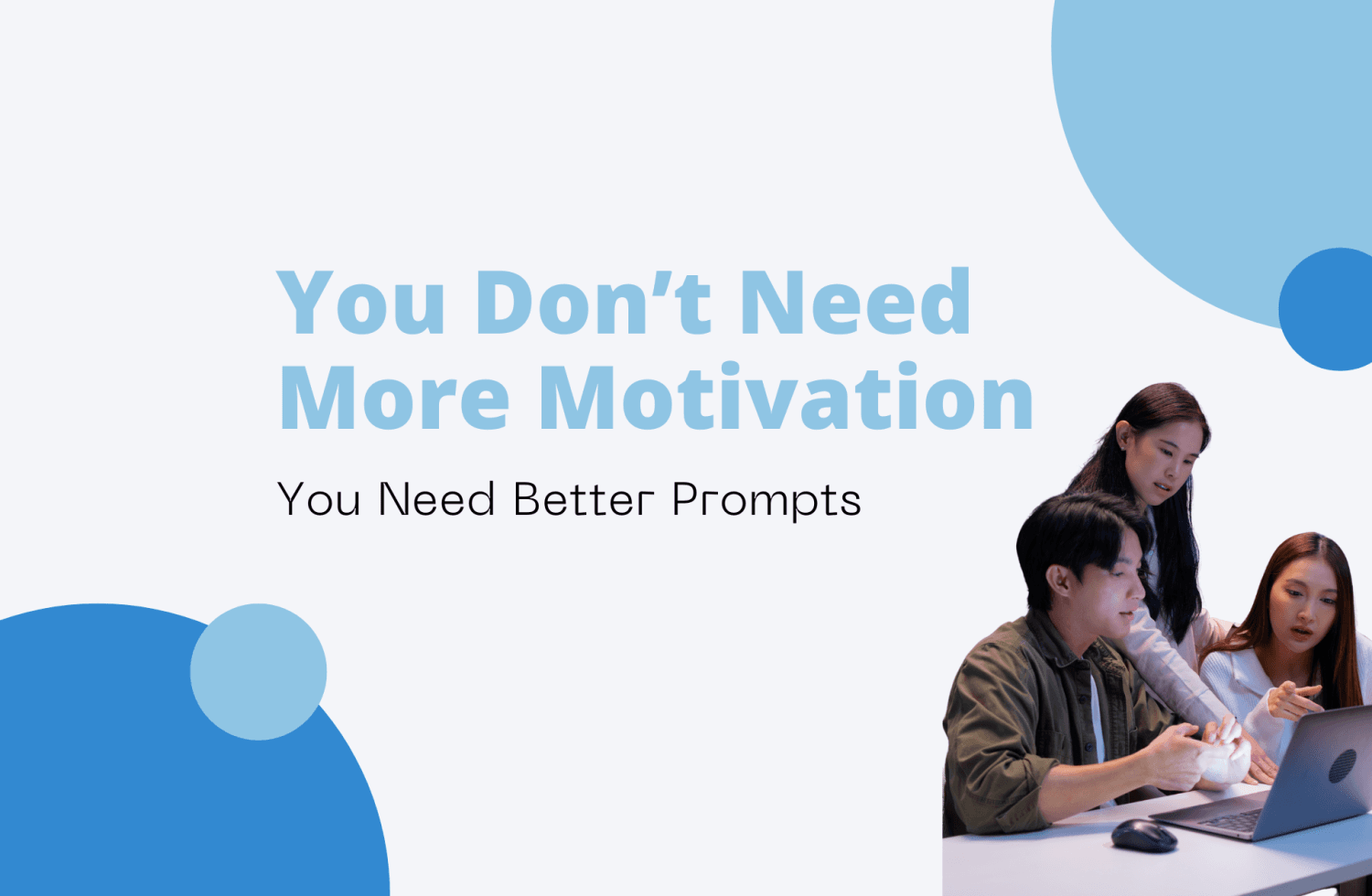Click Here to Download The PDF Version.
Let’s cut straight to it—most people don’t need another business idea.
They need permission to start with the one that’s already sitting in their notes app, halfway written on a whiteboard, or rattling around in the back of their brain.
They need clarity, not complexity.
Movement, not more research.
If you’ve been holding off on launching something because you think you need a perfect strategy or a viral hook or a big audience to make it work, this is for you.
Because what if you didn’t need a five-year plan?
What if the smartest move wasn’t building something massive—but building something simple?
That’s what this blog is about.
Not just the ideas. Not just the strategies.
But the mindset shift that gets you out of limbo and into motion.
And the best part? You don’t have to guess.
There’s a tool that lays it out for you.
The Wheel That Changed the Game
There’s a reason the “Best Online Businesses” wheel has gone viral: it makes something that usually feels overwhelming—starting an online business—suddenly feel doable.
This isn’t a collection of random ideas.
It’s a categorized, color-coded breakdown of what’s actually possible, even if you’re starting from scratch.
Each quadrant represents a different kind of builder.
And the best part is, you don’t have to pick the “right” one.
You just have to pick the one that’s easiest for you.
Here’s how it breaks down:
- AI & Easy Shops (purple): If you want to keep things light and digital, this is for you. Think templates, calculators, digital product shops, and printables.
- Turn Skills Into Sales (blue): Got one thing you’re good at? Turn that into a course, workshop, or done-for-you service.
- Audience Flywheels (green): Love sharing tools, tips, and tutorials? This path turns those into revenue using content and affiliate models.
- Make Once, Sell Daily (orange): The holy grail for people who want to sell digital assets like Notion docs, prompt packs, SOPs, and planners that run on autopilot.
No fluff. Just 20 ways to build something real, fast.
Why Simple Wins in the Real World
Here’s the thing: big ideas are exciting, but they’re also exhausting.
When you try to build something massive out of the gate, you set yourself up to stall.
There are too many steps, too many decisions, and way too much pressure to make it all work perfectly.
But simple? Simple is powerful.
Simple is something you can explain in one sentence.
Simple is something you can build in a weekend.
Simple is something that starts working before you’ve talked yourself out of it.
You don’t need to build an empire.
You need to make your first sale.
You need to send one link, solve one problem, and prove to yourself that you can.
Because once you do, everything else becomes easier.
Simple products are easier to build. Easier to sell. Easier to improve.
And most of all, they’re easier to repeat.
Four Real Stories That Prove It Works
These aren’t hypotheticals.
These are rooted in real problems people face every day at work, in business, or while freelancing.
Each example is based on a different category of the wheel and follows a simple flow: Problem, Agitation, and Solution.
Let’s walk through them.
AI & Easy Shops
They were a consultant who had been doing the work for years.
Great clients. Great referrals.
But things were starting to crack.
The inbox was filling up with the same questions from every new project: “Do you have that resource?” “What should I use for pricing?” “Can you send me that link again?”
Every day felt like Groundhog Day.
The work they loved had turned into a never-ending loop of resending, reformatting, and repeating themselves.
And the worst part? None of it was billable.
So they finally paused.
Took inventory of the top three questions they were tired of answering.
And turned each one into a downloadable.
A pricing calculator.
A new-client intake form.
A starter strategy guide.
They uploaded them into a product shop, added a quick write-up, and started sending links instead of typing replies.
Within the first week, they made $147.
Not life-changing money. But absolutely trajectory-changing.
Because now, their knowledge had a price tag.
And their time got a little more protected.
Turn Skills Into Sales
This person wasn’t trying to build a business.
They just knew how to fix things.
Their friends called them when Zoom wasn’t working, when laptops ran slow, or when Google Drive turned into a black hole.
For years, they helped everyone around them—quietly, quickly, and without asking for anything.
But one day, they realized something: other people were charging for the same advice.
They were selling "How to clean up your desktop" checklists and "Tech setup guides" for $27 a pop.
So instead of overthinking it, they ran a workshop: "Speed Up Your Laptop Without Calling IT."
They made a five-step agenda, hosted it live, and charged $19 to join.
Seventeen people bought it.
And more watched the replay.
Now, it sells as a mini-course while they sleep.
They didn’t build a personal brand.
They didn’t go viral.
They just solved one tiny problem and offered it to the internet.
Audience Flywheels
They were already doing the work.
In Slack channels. In LinkedIn comments. In DMs and emails.
They were the person people came to for tool recommendations, tutorials, and “what do you use for this?” questions.
But it never occurred to them that this was worth anything.
Until they realized those tools? They had affiliate programs.
So they built a resource vault.
Every tool they used went into one page.
They wrote a one-line explanation, added a link, and shared it with the people who were already asking.
No pitching. No cold outreach.
Just one smart system.
After three months, it was pulling in $300 a month.
Quietly. On the side.
It wasn’t about turning into a creator.
It was about recognizing value they were already giving—and making sure it gave something back.
Make Once, Sell Daily
She was running operations at a growing agency.
Every new freelancer brought the same questions.
How do I name this file? Where do I upload revisions? Who signs off?
Every answer meant another break in her focus.
And it wasn’t just annoying. It was unsustainable.
So she built a Notion SOP pack.
It covered everything: task flow, delivery checklists, file rules, naming standards, communication timelines.
Took her one weekend.
She uploaded it.
And every time someone new joined the team, they got the link.
No more emails. No more explaining. No more breakdowns.
The team started moving faster. She started breathing again.
And a system that once lived in her head became an asset the business could rely on.
The Best Resources for Starting Simple
You don’t need to reinvent the wheel.
But you do need a way to get momentum.
These are some of the most powerful, widely-recommended resources for taking action fast:
- Book: The Lean Startup by Eric Ries
- Teaches you how to build fast, test often, and learn before you over-invest. Perfect if you're ready to stop guessing.
- TED Talk: Start Before You're Ready by Matthew Encina
- No fluff. Just real talk about fear, momentum, and how to start before you feel qualified.
- Tool: Canva
- Still the simplest way to make anything look good and feel legit. Templates, planners, social graphics—done in an hour.
The Courage to Start Isn’t a Personality Trait. It’s a Practice.
This isn’t about being fearless.
It’s about choosing to move with the fear still in the room.
Most people wait for permission.
For timing. For signs. For space.
But the truth is, no one is coming to tell you your idea is good enough.
No one is coming to say, “Now you’re ready.”
And that means you have a choice.
You can wait until your confidence shows up.
Or you can move anyway.
You can decide that solving one small problem today is worth more than planning a perfect business you never launch.
You can let this be the start.
Not the finished version. Not the viral moment.
Just the start.
Because starting is what makes everything else possible.
It opens the door to feedback, refinement, learning, and momentum.
It puts your ideas in motion.
And it proves to you—more than any course or quote ever could—that yes, you can do this.
You already have what you need. Now you just have to use it.
Grab the Infographic as a Free PDF
Want to keep a copy of the full "Best Online Businesses" wheel?
Download the high-resolution infographic as a PDF you can save, print, or use as a roadmap for your next offer.
It includes:
- All 20 idea types organized by color category
- Simple descriptions so you can pick your best starting point
- A visual guide you can come back to anytime you get stuck





